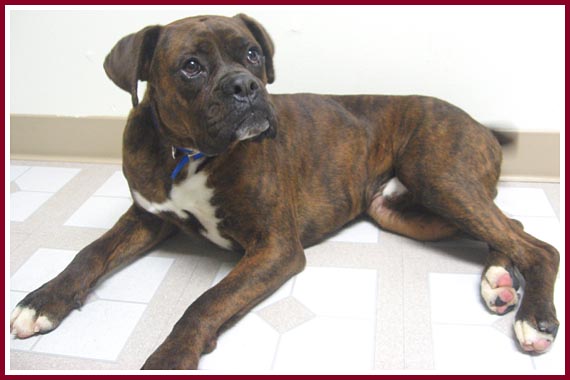 Meet Max the Boxer! Meet Max the Boxer!
 Meet Max the Boxer,
who, with his heart of gold and spirit of a champion, was featured in Part Two
of WTMJ's recent investigative report on puppy mills in Wisconsin. Such a happy
guy -- see that blur in the right side of the photo? That's his tail, going a
mile a minute. In fact, his whole body wagged with joy when anyone approached
him. And just look at those soulful eyes. You can see yourself in those eyes Meet Max the Boxer,
who, with his heart of gold and spirit of a champion, was featured in Part Two
of WTMJ's recent investigative report on puppy mills in Wisconsin. Such a happy
guy -- see that blur in the right side of the photo? That's his tail, going a
mile a minute. In fact, his whole body wagged with joy when anyone approached
him. And just look at those soulful eyes. You can see yourself in those eyes
However,
those beautiful eyes also showed a condition called "Ventral Lid Bilateral
Entropian," which means that his eyelids turned inward so that his lashes
scratched his corneas. At least two dogs purchased at the same auction from
"breeder" Ella Mae Brubaker suffered from this painful condition. It
is correctible by very expensive surgery (an estimated $275 - $350 per eye) --
that the buyer would have to pay for. That is, unless the buyer were a
commercial breeder who didn't care if the dog went blind, because "you
don't need eyes to be a stud dog." (For more information on entropian
eyelids, please see the
Animal Eye Care website.)
What
you can't see is even more serious: this big, beautiful, happy-go-lucky guy
also suffered from a disease called canine brucellosis, best described as a
"canine STD." As a stud dog, he would pass it along to every female
he mated with. Brucellosis is also passed along in other body fluids, including
urine, saliva, feces, discharge and miscarried puppies in the females.
Canine
brucellosis is a zoonotic disease, meaning that PEOPLE can get this disease
from an infected dog. There are also strains of brucellosis which can infect
cattle, hogs, sheep, and several other species. Because of the potential for
human infection and the rapidity of spread of the organisms, the Center for
Disease Control (CDC) considers brucellosis a very serious disease which must
be reported to the local health authority. In Wisconsin, that is the Wisconsin
Division of Public Health.
 Though the International
Veterinary Information Service states, "infections [of canine brucellosis,
B. Canis] are uncommon and they are usually mild," the Wisconsin Division
of Public Health is much more cautious: Though the International
Veterinary Information Service states, "infections [of canine brucellosis,
B. Canis] are uncommon and they are usually mild," the Wisconsin Division
of Public Health is much more cautious:
"Although
reported cases of human B. canis infections are uncommon, the disease is
thought to be severely underreported and unrecognized due to the fact that
standard brucellosis [blood tests] in humans do not detect B. canis
infection."
Young
children, seniors, those with compromised immune systems, and pregnant women
are at greater risk; generally symptoms are flu-like but they can be much more
serious.
One effect of the disease in male dogs is sterility; in female dogs, it causes
miscarriages. Animals who cannot "produce" are of no use to
commercial breeders. They will be discarded or sold -- to another breeder or an
unsuspecting family looking for a pet -- with the seller totally unaware that
the dogs are sick.
Since
dogs infected with brucellosis may not have any visible symptoms, diagnosis
requires laboratory blood testing. Reputable dog breeders routinely
ensure that both parents are disease-free before mating. (For more on canine
brucellosis, please see the links below.)
In
its recent investigative reports on puppy mills in Wisconsin, Milwaukee TV
station TMJ-4 visited the kennel of Ella Mae Brubaker, who sold Max at the
Thorp Auction.
"So
do you take precautions to make sure the dogs are healthy before you give them
to people?" reporter John Mercure asked in his interview with Mrs.
Brubaker.
"No," she replied. "That's your responsibility to take them to
the vet."
When
specifically asked about Max and brucellosis, she reiterated that it wasn't her
responsiblibity -- "I sold those to Leon [Yoder, an auctioneer at the
Thorp auction] and that was the end."
 Well, no, actually, it wasn't the end. The Wisconsin Puppy Mill
Project was adamant that State follow up with Ella Mae Brubaker, Edward
Zimmerman, and other pet dealers among whom Max was traded or sold during his
short life. We also reminded our legislators that this was just one of the many
serious results of the lack of regulation on the "puppy mill
business." We wanted them to understand that the brucellosis didn't start
and end with Max, it came from the mills. We insisted that these
mills test their dogs to protect the health of Wisconsin pets and their human
families. This testing was incorporated into WI Act 90, which was passed in
2009 partially thanks to stories like Max's. Well, no, actually, it wasn't the end. The Wisconsin Puppy Mill
Project was adamant that State follow up with Ella Mae Brubaker, Edward
Zimmerman, and other pet dealers among whom Max was traded or sold during his
short life. We also reminded our legislators that this was just one of the many
serious results of the lack of regulation on the "puppy mill
business." We wanted them to understand that the brucellosis didn't start
and end with Max, it came from the mills. We insisted that these
mills test their dogs to protect the health of Wisconsin pets and their human
families. This testing was incorporated into WI Act 90, which was passed in
2009 partially thanks to stories like Max's.
What
did this all mean for Max himself? Unfortunately, his "tail" did not
have a happy ending. Though canine brucellosis is treatable -- spay or neuter,
a long, expensive course of antibiotics, and periodic monitoring and retesting
-- complete cures are rare. The bacteria "lurks" in the body and
reinfect the dog without warning. Untreated -- such as in a repeat infection
that isn't detected -- the disease eventually attacks joints and bone.
The
shelter veterinarian told investigators in that TMJ-4 report, "If I had a
dog that was diagnosed with brucellosis, I most likely would euthanize it,
simply because its lifestyle, its quality of life is going to be reduced, its
length of life is going to be reduced, and there is the chance of spreading
it."
In
a kennel situation, infected dogs of either gender are immediately euthanized.
For a pet owner, there will be a tough decision. The Wisconsin Division of
Public Health told us in a letter that they strongly recommended that males in
particular -- Max -- should be euthanized.
So,
with great regret, Max was eased out of this life on May 7, 2007, at the age of
11 months, 359 days.
GOOD DOG,
Max.
|
Note: A second boxer from ELLA MAE BRUBAKER, purchased at the
10 Mar 07 THORP DOG AUCTION, also tested positive for brucellosis.
|
|



 Though the International
Veterinary Information Service states, "infections [of canine brucellosis,
B. Canis] are uncommon and they are usually mild," the Wisconsin Division
of Public Health is much more cautious:
Though the International
Veterinary Information Service states, "infections [of canine brucellosis,
B. Canis] are uncommon and they are usually mild," the Wisconsin Division
of Public Health is much more cautious: Well, no, actually, it wasn't the end. The Wisconsin Puppy Mill
Project was adamant that State follow up with Ella Mae Brubaker, Edward
Zimmerman, and other pet dealers among whom Max was traded or sold during his
short life. We also reminded our legislators that this was just one of the many
serious results of the lack of regulation on the "puppy mill
business." We wanted them to understand that the brucellosis didn't start
and end with Max, it came from the mills. We insisted that these
mills test their dogs to protect the health of Wisconsin pets and their human
families. This testing was incorporated into WI Act 90, which was passed in
2009 partially thanks to stories like Max's.
Well, no, actually, it wasn't the end. The Wisconsin Puppy Mill
Project was adamant that State follow up with Ella Mae Brubaker, Edward
Zimmerman, and other pet dealers among whom Max was traded or sold during his
short life. We also reminded our legislators that this was just one of the many
serious results of the lack of regulation on the "puppy mill
business." We wanted them to understand that the brucellosis didn't start
and end with Max, it came from the mills. We insisted that these
mills test their dogs to protect the health of Wisconsin pets and their human
families. This testing was incorporated into WI Act 90, which was passed in
2009 partially thanks to stories like Max's.